#investment casting technolog
Explore tagged Tumblr posts
Text
Just something that's been bothering me. What's up with the whitewashing in trigun stampede?


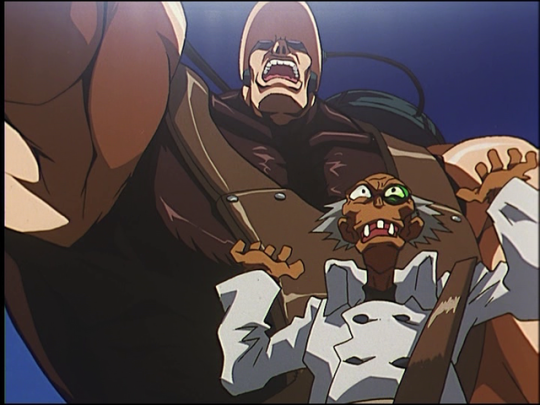
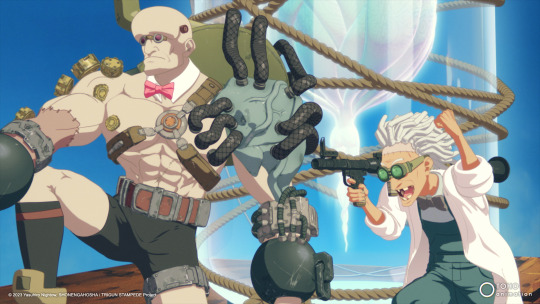
Somehow the 1998 version had more diversity in skin colors than the 2023 version
#I don't like being negative in fandom spaces because people come here to have fun not fight#but I feel like tristamp had way too many problems and I don't really see people talk about them?#I understand that people like it for it's good parts (I do too) but I feel like the negatives outweigh the positives?#I didn't like the changes in the personalities of the main cast. I didn't like how Millie wasn't there#I didn't like the pacing (why do we have to be invested in that one pregnant woman in the beginning? she never even shows up again)#the models were ok (but I strongly dislike these 'skinny' pieces of technology. that's a personal preference tho)#the animation was pretty stellar (the camera movement too)#these weird incest-y undertones creeped me out(I don't know if it was intentional but some people in the fandom definitely took it that way)#anyway#don't come after me#just expressing my opinion#I still really like trigun. stampede just wasn't the one for me#thank god I decided to watch the 1998 version first#trigun#not art#talking about this a whole year after I watched it who cares#delete later#maybe
16 notes
·
View notes
Text
Investment Casting Foundry At Rudracastings
Welcome to rudra castings your one-stop destination for high-quality metal casting services.As a leading investment casting foundry we take pride in offering our customers superior quality castings that meet their unique requirements.Our team of experienced professionals is committed to providing you with customized solutions that are tailored to your specific needs.We use state-of-the-art technology and advanced techniques to ensure the highest level of accuracy and precision in every casting project we undertake.At rudra castings we specialize in a wide range of metal casting services including investment casting sand casting and centrifugal casting.Our investment casting foundry offers a variety of alloys to choose from including stainless steel carbon steel and aluminum.Whether you're looking for prototypes short-run or high-volume production we have the expertise and resources to meet your needs.Contact us today to learn more about our metal casting services and how we can help you bring your ideas to life.
http://www.rudracastings.com/
#precision castings#stainless steel castings#feinguss foundary#metal casting#lost wax castings#investment casting technology#investment casting manufacturers#metal casting near me#investment casting foundry#investment casting#metal casting process
0 notes
Text
Sentient Nightmares
~~~~~~~~~~~~~~~~~~~~~~~~~~~~~
They were devastated to find out that their entire existence was just one big game for millions to enjoy and discard. All of the disasters they faced, all of the blood and tears spilt, it was all for nothing? All just some scheme to get people invested in their story?
Leviathan was the first to find out, his skills in technology and multiple hours in games that somehow became sentient led him to finding out about their own game. He didn't know how to feel, amazed that he was important enough to have his own game, or distressed to find out that everything in his life was a lie, programed to go the way it does.
Levi's distress somehow gets the attention of the other brothers, leading them to find out the same thing Leviathan did. Lucifer was the most distraught, the death of his sister, the shenanigans of his brothers, the blood he spilt, the tears that burned away the flesh on his cheeks, all of that meant nothing. The sick bastards made it so they could all. Feel. Pain.
But. they had to keep up appearances, finding out that they were not the only versions of themselves that played up the role of the cast of 'obey me, one master to rule them all' couldn't stop the player from playing the game. The title of their game got them thinking, thinking about a certain someone, the player. The MC. The human they had grown to love, or had been programmed to love. Their player kept coming to their game, investing time in their stories, redid most of the lessons and always chose the best answers to make them happy and grow their love meter. Who are they?
Once again, Levi was the first to see your face, managing to hack into your phone to see who was investing so much of their time into a game made about them? He found you beautiful, just like how he did in the game. The way you smiled and certain lines, the way you frowned when something sad came up in the story timeline, the way you focused on the dance battles and the small minigames, love at first site.
He went from watching you while you played to watching you whenever you used your phone, hacking into your camera so he could see you whenever you laid in bed, whenever you checked the time, he became infatuated with you. Though, this secret of his couldn't be hidden forever.
Mammon spilled the beans to everyone once he walked in on Levi watching you on his monitor. After a long scolding from lucifer and disapproving looks from his brothers, they too became infatuated with you, the real you. You weren't just a blurry face with programmed responses, this was the real you! Their human, their mc! Gods how they fell hard for you
It soon became a massive thing among the brothers, they all managed to get access to your camera and microphone, listening in to all of the different things you talked about, different things you liked, the different outfits you wore, you were perfect. It soon started to effect your gameplay, the brothers started to go off script, started complimenting you, mentioning the things you liked during conversations, even once asmo complimented you about the outfit you were wearing.
You didn't think much of it at the time, thinking they were just strange coincidences. It wasn't until Solomare announced that there would be no more lessons added to either games, the brothers were distraught. You could stop coming to them! You might uninstall the game, you'll forget about them! They couldn't let this happen, not by a long shot. They had to act fast, they couldn't lose you, not again.
.
. .
. . .
You woke up gasping, drenched in cold sweat as you just had a horrific nightmare. Breathing heavily, you used the light of your phone to check out your surroundings, making sure nothing was out of placed or moved. Everything seemed normal so you let out a small sigh, you needed water.
As your feet touched the ground, you left to go get some water from the kitchen, leaving your phone behind. You didn't see the 7 eyes watching you from the dark of your room, slowly moving in to make sure you wont ever try to leave. Not now. Not ever.
Welcome home, MC <3
~~~~~~~~~~~~~~~~~~~~~~~~~~~~~~
This will be a "veiwers decide" type of story in the next part! That basically means that i will right the 2nd part to this, but you get to decide MC's action and fate by deciding their actions for them
let the games begin >:)
~~~~~~~~~~~~~~~~~~~~~~~~~~~~~~~
Tag list
@completelyshatteredbrokenmschf @navywafflez @catdalmata @lethby
#valer1esgallery#obey me nightbringer#obey me shall we date#obey me#obey me!#obey me swd#obey me x mc#obey me x reader#obey me x y/n#obey me fandom#obey me angst#obey me yandere#obey me fanfic#obey me fic#obey me lucifer x you#obey me lucifer#obey me lucifer x reader#obey me lucifer x mc#obey me mammon#obey me mammon x reader#obey me mammon x you#obey me mammon x mc#obey me leviathan#obey me levi x reader#obey me levi x mc#obey me leviathan x reader#obey me leviathan x you#obey me leviathan x mc#obey me satan x reader#obey me satan x mc
146 notes
·
View notes
Text
There is no obvious path between today’s machine learning models — which mimic human creativity by predicting the next word, sound, or pixel — and an AI that can form a hostile intent or circumvent our every effort to contain it. Regardless, it is fair to ask why Dr. Frankenstein is holding the pitchfork. Why is it that the people building, deploying, and profiting from AI are the ones leading the call to focus public attention on its existential risk? Well, I can see at least two possible reasons. The first is that it requires far less sacrifice on their part to call attention to a hypothetical threat than to address the more immediate harms and costs that AI is already imposing on society. Today’s AI is plagued by error and replete with bias. It makes up facts and reproduces discriminatory heuristics. It empowers both government and consumer surveillance. AI is displacing labor and exacerbating income and wealth inequality. It poses an enormous and escalating threat to the environment, consuming an enormous and growing amount of energy and fueling a race to extract materials from a beleaguered Earth. These societal costs aren’t easily absorbed. Mitigating them requires a significant commitment of personnel and other resources, which doesn’t make shareholders happy — and which is why the market recently rewarded tech companies for laying off many members of their privacy, security, or ethics teams. How much easier would life be for AI companies if the public instead fixated on speculative theories about far-off threats that may or may not actually bear out? What would action to “mitigate the risk of extinction” even look like? I submit that it would consist of vague whitepapers, series of workshops led by speculative philosophers, and donations to computer science labs that are willing to speak the language of longtermism. This would be a pittance, compared with the effort required to reverse what AI is already doing to displace labor, exacerbate inequality, and accelerate environmental degradation. A second reason the AI community might be motivated to cast the technology as posing an existential risk could be, ironically, to reinforce the idea that AI has enormous potential. Convincing the public that AI is so powerful that it could end human existence would be a pretty effective way for AI scientists to make the case that what they are working on is important. Doomsaying is great marketing. The long-term fear may be that AI will threaten humanity, but the near-term fear, for anyone who doesn’t incorporate AI into their business, agency, or classroom, is that they will be left behind. The same goes for national policy: If AI poses existential risks, U.S. policymakers might say, we better not let China beat us to it for lack of investment or overregulation. (It is telling that Sam Altman — the CEO of OpenAI and a signatory of the Center for AI Safety statement — warned the E.U. that his company will pull out of Europe if regulations become too burdensome.)
1K notes
·
View notes
Note
the vespid used to have armor when on all their models i wonder what the lore reason is for them now deciding to go in naked did they just become freaky?
So, Kill Team lore says Though less widespread than the Kroot, who make up a large percentage of the T’au Empire’s auxiliaries, the Vespid are afforded no less respect by the Fire Caste due to their resilience and combat utility. They were initially introduced as small teams of support troops armed with vicious neutron blasters – short-ranged weapons that used the Vespid homeworld’s unique crystals to project deadly radiation. Their deployments have since grown to encompass a wider range of battlefield roles, and all are armed with wondrous Earth Caste inventions.
From this, we could infer that, as understanding of the Vespid has increased, the T'au have discovered that they don't actually need armour, and that their physiology renders armour pointless. Being innately highly mobile and tough to the point that the T'au can just funnel technology purely into communication equipment and weapons would be very cool, and helps demonstrate the T'au Empire's willingness to learn about and properly utilise allies. If some of your guys don't need armour, invest in weaponry and gear that enables them to operate effectively within their own niche.
116 notes
·
View notes
Text
An Arbitrary Collection of Book Recommendations
(put together for a friend out of SFF I've read over the last couple of years)
Cli-Fi
Tusks of Extinction and/or The Mountain in the Sea by Ray Nayler. They’re pretty different books in a lot of ways – one is a novel about discovering a certain species of squid in the Pacific might have developed symbolic language and writing, the other a novella about a de-extinction initiative to restore mammoths to the Siberian taiga – but they share a pretty huge overlap in setting, tone and themes. Specifically, a deep and passionate preoccupation with animal conservation (and a rather despairing perspective on it), as well as a fascination with transhumanism and how technology can affect the nature of consciousness. Mountain is his first work, and far more substantial, but I’d call it a bit of a noble failure in achieving what it tries for. Tusks is much more limited and contained, but manages what it’s going for.
A Half-Built Garden by Ruthanna Emrys. In a post-post-apocalyptic world that’s just about figured out how to rebuild itself from the climate disasters of the 21st century (but that’s still very much a work in progress), aliens descend from the sky and make First Contact. They’re a symbiotic civilization, and they’re overjoyed at the chance to welcome a third species into their little interstellar community – and consider it a mission of mercy besides, since every other species they’ve ever encountered destroyed themselves and their planet before escaping it. Awkwardly, our heroine and her whole society are actually pretty invested in Earth and the restoration thereof – and worried that a) the alien’s rescue effort might not care about their opinions and b) that other interest groups on earth might be more willing to give the hyper-advanced space-dwelling aliens the answers they want to hear. Basically 100% sociological worldbuilding and political intrigue, so take that as you will.
Throwback Sci Fi
Elder Race by Adrian Tchaikovsky is possibly the only thing I’ve read published in decades to take the old cliche of ‘this generic-seeming fantasy world is actually the wreckage of a ruined space age civilization, and ‘magic’ and ‘monsters’ are the remnants of the technology’ and play it entirely straight. Specifically, it’s a two-POV novella, where half the story is told from the perspective of a runaway princess beseeching the ancient wizard who helped found her dynasty for help against a magical threat, and half is from the perspective form the last surviving member of a xeno-anthropology mission woken out of stasis by the consequences of the last time he broke the Prime Directive knocking on his ship tower door and asking for help. Generally just incredible fun.
Downbelow Station by C. J. Cherryh is, I think, the only thing on this list written before the turn of the millennium. It’s proper space opera, about a habitat orbiting an immensely valuable living world that’s the lynchpin of logistics for the functionally rogue Earth Fleet’s attempt to hold off or defeat rebelling and somewhat alien colonies further out. The plot is honestly hard to summarize, except that it captures the feel of being history better than very nearly any other spec fic I’ve ever read – a massive cast, none of them with a clear idea of what’s going on, clashing and contradictory agendas, random chance and communications delays playing key roles, lots of messy ending, not a single world-shaking heroes or satanic masterminds deforming the shape of things with their narrative gravity to be seen. Somewhat dated, but it all very impressively well done.
Pulpy Gay Urban Fantasy Period Piece Detective Stories Where Angels Play a Prominent Role
A Master of Djinn by P. Djèlí Clark stars Fatma el-Sha’arawi, the youngest woman working for the Ministry of Alchemy, Enchantments and Supernatural Entities in Cairo, a couple of decades after magic returned to the world and entirely derailed the course of Victorian imperialism. There’s djinn and angels and crocodile gods, and also an impossible murder that needs solving! The mystery isn’t exactly intellectually taxing, but this is a very fun tropey whodunnit whose finale involves a giant robot.
Even Though I Knew The End by C. L. Polk is significantly more restrained and grounded in its urban fantasy. It’s early 20th century Chicago, and a PI is doing one last job to top off the nest egg she’s leaving her girlfriend before the debt on her deal with the devil comes due. By what may or may not be coincidence, she stumbles across a particularly gruesome crime scene – and is offered a deal to earn back her soul by solving the mystery behind it. Very noir detective, with a setting that just oozes care and research and a satisfyingly tight plot.
High Concept Stuff That Loves Playing around With Format and the Idea of Narratives
Radiance by Catherynne M. Valente is a story about a famous documentarian vanishing on shoot amid mysterious and suspicious circumstances, as told by the recovered scraps of the footage she was filming, and different drafts of her (famous director) father’s attempt to dramatize the events as a memorial to her. It’s set in a solar system where every planet is habitable and most were colonized in the 19th century, and culturally humanity coasts on in an eternal Belle Epoque and (more importantly) Golden Age of Hollywood. Something like half the book is written as scripts and transcripts. This description should by now either have sold you or put you off entirely.
The Spear Cuts Through Water by Simon Jimenez is the only classic-style epic fantasy on this list, I believe? The emperor and his three demigod sons hold subjugated in terror, but things are changing. The emperor, terrified of death, has ordered a great fleet assembled to carry him across the sea in pursuit of immortality. The day before he sets out on his grand pilgrimage to the coast, a guilt-ridden guard helps the goddess of the moon escape her binding beneath the palace. From there, things spiral rapidly out of anyone’s control. The story’s told through two or three (depending( different layers of narrative framing devices, and has immense amounts of fun playing with perspective and format and ideas about storytelling and legacy.
I Couldn’t Think of Any Categories That Included More Than One of These
All The Names They Used For God by Anjali Sachdeva is a collection of short stories, and probably the most literary thing on this list? The stories range wildly across setting and genre, but are each more or less about the intrusion of the numinous or transcendent or divine into a world that cracks and breaks trying to contain it. It is very easily the most artistically coherent short story collection I’ve ever read, which I found pretty fascinating to read – but honestly I’m mostly just including this on the strength of Killer of Kings, a story about an angel sent down to be John Milton’s muse as he writes Paradise Lost which is probably one of the best things I read last year period.
Last Exit by Max Gladstone – the Three Parts Dead and How You Lose the Time War guy – could be described as a deconstruction of ‘a bunch of teenagers/college kids discover magic and quest to save the world!’ stories, but honestly I’d say that obscures more than it reveals. Still, the story is set with that having happened a decade in the past, and the kids in question have thoroughly fucked up. Zelda, the protagonist, is kept from suicide by survivor’s guilt as much as anything, and now travels across America working poverty jobs and sleeping in her car as she hunts the monsters leaking in through the edges of a country rotting at the seams. Then there’s a monster growing in the cracks of the liberty bell, an in putting it down she gets a vision of someone she thought was dead is just trapped – or maybe changed. So it’s time to get the gang together again and save the world! This one’s hard to rec without spoiling a lot, but the prose and characterization are all just sublime. Oddly in conversation with the whole Delta Green cosmic horror monster hunting subgenre for a story with nothing to do with Lovecraft.
Some Desperate Glory by Emily Tesh is a story about aliens destroying the earth, and growing up in the pseudo-fascist asteroid survivalist compound of the last bits of the human military that never surrendered. It stars a heroine whose genuinely indoctrinated for the first chunk of the book and just deeply endearing terrible and awful to interact with, and also has a plot that’s effectively impossible to describe without spoiling the big twist at the end of the first act. Possibly the only book I read last year which I actively wish was longer – which is both compliment and genuine complaint, for the record, the ending’s a bit messy. Still, genuinely meaty Big Ideas space opera with very well-done characterization and a plot that does hold together.
#meta#book recommendations#sff#sharing this mostly so I don't lose it next time my laptop dies#and also hey why not
188 notes
·
View notes
Note
I don't know if this was always mentioned, but I personally headcannon Daroach, being the charming gentleman thief he is, likes to playfully flirt with Susie from time to time. Either to steal something from her, or just to mess with her.
Gentleman thief vs Business woman just seems like a fun dynamic to play with!
Anon, I am shaking your hand...!
Yes, I think they have a potentially wonderful dynamic and ought to interact WAY more than they do! Red and Pink. Grey and White. Rich business woman and literal RAT MAN. (Both "ice" themed too.)
...Not to mention that before she was a CEO, Susie fashioned herself as a "corporate spy" working against her father! Spy vs Thief, anyone? She may know some tricks of her own from that particular skillset! And boy, wouldn't THAT be a fun conversation to listen in on!
(And yet you can see how they would have completely different outtakes on life, too! Business and order versus the free life of a phantom thief! A woman who is always looking centuries forward technology-wise vs a rat man who acts and dresses like he's from an 18th century crime novel, including fantasy steampunk tech.)
Now, I'm one of the odd ones who sees *most* of the cast as adults, including those that others don't (it's a personal attachment / investment + wanting to see more spectrum-coded adults in fiction thing) but I can appreciate the fun of having the ones who feel the most "inarguably adult" have a little playful "strictly business" flirting!
-
Not that the ask was specifically about shipping as much as simply how Daroach talks to her (and lets be honest, guy probably flirts w/ MOST people) but when it comes to actual -interest-/sexuality HC, I enjoy me some (Dark) Metaroach and ZanSusie, but those two are at LEAST bi! I feel they can have a little ship tease!/lh
-
Edit: Right as I was sending this post to the queue, my brain whispered “Why do they need to be messing with EACH OTHER when they could COOPERATE?” And floated me a mental picture of some one-shot evil corporation that Daroach and Susie have BOTH infiltrated separately (in disguise) to get dirt on, only to run into each other, recognize each other, and are encouraged to cooperate to get what they need!
…Kirby expanded cast animeeeeee…
#Kirby#Susie Haltmann#Daroach#mentions of the following: Metaroach + ZanSusie (I-Is that their ship name? ^^; ) + SuRoach ?? Darusie ?? IcecreamRat ??#I need to draw some IcecreamRat (lol) now...#Daroach is so good I need to pair him with lots of charas#(Has a Daroach + Magolor piece sitting in my backlog too)#HALLLL!! KUMAZAKIII!! WHERE IS MY 100+ EPISODE DAILY LIVES OF KIRBY CHARACTERS ANIME SERIES?!?!?#Ask to tag#Dess Text Post
62 notes
·
View notes
Text
The Mecha AU-AU continues. In todays episode; the Protectobots exist, Trepan is weird, and Vortex gets a pleasant (?) surprise.
I've also written an UNGODLY amount of Combaticon pre-mech content so ig that's gonna have to escape containment at some point, weeh.
“Hey, isn’t that Felix?”
Hot Spot watched the TV in the break room intently as he drank his coffee. His cereal sat half-eaten and forgotten on the table in front of him. Blades looked over from the toaster, flinching when his toast popped up.
“Felix?” Blades asked. “What, on TV?” He asked in disbelief. He rounded the counter and jumped over the back of the sofa to sit next to his commander. “No way.”
“Seriously – look!” Hot Spot grabbed the remote and rewound, pausing when Felix had come up out of the joint of a mech, looking at something behind the camera in pure relief.
“Holy shit. That is Felix!”
“Look – he gets into that mech.” Hot Spot wound it forwards, showing the brief moment of Felix climbing up and slipping into the face of the mech, the visor snapping shut behind him. “Do you think he’s a pilot?”
“No, no way – he’s a medic. He never ever wanted to pilot, they’d have to be really desperate for them if they’re resorting to using their medical crew.”
“He seems way too comfortable getting into that thing.” Hot Spot shuddered. “It looked like it was eating him.”
“Don’t, that’s creepy.” Blades cringed, climbing back over the sofa to rescue his toast.
“Stop that.” Hot Spot scolded. “Just walk, it’s not far!”
Blades ignored him. “Have you heard the rumours about that base? With all the body bags? I wonder what that was all about.”
Hot Spot rolled his eyes and returned to his cereal. “No idea. I guess when you’re fighting quintessons your life expectancy isn’t great.”
“Neither is ours, and we don’t have giant metal exoskeletons or unexplainable numbers of body bags. What’s their excuse?”
Hot spot shrugged. “No idea. Why don’t you ask them?”
“Oh, good shout – I’ll text Felix.”
“Blades-”
“Relax! I’m not going to say anything stupid.”
“You said that last time and look where that got us.”
“Yeah, right, fair, whatever.” Blades waved him off dismissively. “I’ll just mention I saw him on TV, see?” He turned his phone around to show Hot Spot. “Totes fine, perfectly safe, nothing could possibly go wrong. Worst case scenario, he ignores me, best case he says ‘haha yup’ or something and that’s the end of that.”
“Don’t make him uncomfortable. You know he asked to be left alone.”
“We send each other reels on Instagram again, I think it’s okay if I reach out.”
Hot Spot sighed and unpaused the TV.
-------------------------------------
The tech was too new when they shoved their first AI’s into it.
They’d tested a connection between live pilots already - two separate units that operated as one. They found that it worked, to a point. The two consciousnesses would wave, but never shake hands - the physical contact snapped their psyche. It was only when they had developed the RABIT units that they could truly operate as one – but the pinch point had always been getting them into the same machine . It just did things to people.
Prowl and Jazz had been their best duo’s team, their dark horse - the pair flew under the radar until they were fitted with the experimental tech and blew the project out of the water straight into the lap of investment. And, Swindle noticed, into the scope of
Trepan.
He giggled as he watched them, humming and hawing. Which one? Which one would be his sacrifice?
They’re married , they argued. You can’t force one to pilot the corpse, that’s wildly unethical.
Fine. Then we find a new pilot.
Swindle could only watch. If he objected now, he’d cast doubt onto himself. Vortex would be in more danger. His team might stay in that poxy little box forever.
Vortex himself was a monster. As a prototype, he was huge. Way too big. The technology hadn’t been fine tuned yet to bring the scale back down - and so he towered above them, a monument to their attempt at survival.
And he’d survived. The experimental tech, too fresh and too new, had destroyed the rest of his prototype cohort. Out of the original 15, he alone survived. The 11 carved into his shoulder shone in the red of the blood that they had spilled to get there.
The next cohort was smaller. Swindle hadn’t put forwards any of his team.
You want people who will survive - these guys ain’t it. I know my team, they haven’t got the moxy. The tech needs to be more stable.
Trepan didn’t raise his brows. He seemed to delight in his harsh words, and selected 5 other banked sacrifices.
They all died too. Burned out. Literally. They’d decreased the size of the mechs, the faults and failures of the predecessors informing their design.
Vortex stood alone.
Swindle chewed his nails until they bled fretting over his mental state. He couldn’t get close to him, he couldn’t go and check - he couldn’t even acknowledge him. The magnifying glass pinned him, every breath studied. The tech was so new. Was it really still
Vortex in there? Was he recognisable? Did he know what was going on? Did he know anything ?
God Tex, I’m so sorry.
The pilots falling out of him started telling horror stories.
There was something else in there with them. Something beyond the AI, a malevolent presence in there that wanted to hurt them. The researchers had been dismissive, but Trepan had been intrigued. Swindle had been corralled by him, armed with questions.
What had Svastjan been like in life? Did he have the same devotion to violence in life as he did in death? Was he particularly skilled with any weapons? Were any other members of his team like him? Or was he alone in his brutality?
He told him the truth. He was like this. He had a tendency to jump on the heads of the ones he’d knocked to the ground, to force himself through their body. Pistols and knives were his speciality. And no – he was alone. The others were what they liked to call well adjusted.
The expectation he had was that Trepan would be disappointed, but he had just hummed and nodded his head, quickly returning his attention to the next mech to come off the assembly line.
He uncomfortably ran a hand through his hair as he saw the footage that aired. Trepan was sat beside him, still as much of a crane of a man as he had been back in the research lab. He sat with his legs daintily crossed, his hands resting on his knees as he sat up perfectly ram-rod straight.
“Who is the man so comfortable with our pet?” Trepan asked.
He’d started referring to Vortex as his pet as some kind of cute nickname for him – he’d survived so much and had given him so much information to chew on that he’d grown a real soft-spot for him.
“That’s Felix.”
“His pilot?”
“Correct. First one he hasn’t outright murdered or mentally destroyed.”
“Fascinating.” He steepled his fingers together, eyes wide and beady, taking in all the information on the screen. “He seems to be very familiar with the mech.”
“Felix is a weird one.” Swindle knew he had to toe the line, to act as a gossip to displace the suspicion, to offload it somewhere else. “He’s weirdly attached to his mech – he’s always around it.” He hoped the look on Trepans face wasn’t a bad sign.
“Vortex is a success. Finally.” He leaned back in satisfaction. “We can justify further use of his batch. As their guardian… choose. Who is next to be interred into living metal?”
Swindle remembered the day the experiments came to an end vividly. He hadn’t been able to stomach it after they’d all started screaming for each other – and they weren’t using their call-signs, either. The time for that had long gone – it was their real names that had come spilling out. The ones their mothers had given them as they first swaddled them in blankets. The ones that had been carried on the wind when it was time for dinner. The ones now spoken in hushed voices after dinner.
All he had left of them was a fucking box. He could hold all four of them in one hand. Small components that were welded into the motherboard. A collective century of experience and knowledge and history condensed down into four identical electrical components.
Swindle wanted to scream. He wanted to scream and cry and throw himself off of the bridge, swept away by the current and buried under sediment and rubbish and corpses. But he couldn’t - he had to hold it together. If he broke now, he wouldn’t be able to live with himself. There was a job to be done.
Vortex was the obvious first pick. The next pick was harder. Significantly so. Who next? It had been a question that had haunted him ever since.
Swindle felt himself break out into a cold sweat. The tech wasn’t anywhere near where he wanted it to be, and the thought of having to try and wrangle two of them had him sprouting greys. He ran through them in his mind, counting it off on his fingers.
Onslaught. His commander. He’d trusted him with this, and he was certain to be disappointed with how it had all worked out, but he was also the one who could keep Vortex in line. However, Vortex was currently staying firmly in line and was studiously behaving himself now that he had Felix. It seemed that he’d cottoned on to the fact he was now the bargaining chip, and he was determined to play the part of a good little boy in order to keep his favourite toy.
Brawl. His personality was explosive, and any mech they made for him would have to have the thickest armour available, and even then that probably wouldn’t be enough. They weren’t at the point of making a viable mech for him yet, which left…
Blast Off. Their unifier. The centre of their team, their point of gravity. Damn, it was fucking obvious now – if Trepan was keen to crack the mausoleum back open and bring his team online, then he’d have to start with the one who kept them from cannibalising each other.
Trepan was looking at him expectantly, a small smile on his face.
“Jean-Luc B. Ollier.” Swindle promptly replied. “Code name: Blast Off. He’s a sniper and a navigator – where are we at with that gun? He’d be a great test for it.”
“Not Oscar Den Koning? Juan Perez?”
“Oscar will be hard.” Swindle replied. “Very strong personality – if we want him, we’ll need the others all up and operational first. Juan was our demolitions expert – we don’t have the ability to make armour strong enough to withstand the beating he would put it through right now.”
Trepan nodded like a priest having sins confessed to him. “Very well. I will pass this on. Thank you as always, Swindle. This has been most enlightening.”
“When will the designs be ready for viewing?” Swindle asked.
“Very soon, I hope.”
And with that, he was gone. Swindle exhaled slowly before breathing in deeply, holding it there in his lungs, and slowly exhaling.
Fuuuuuuck.
-------------------------------------
“Did you hear? They’re making a new batch of mechs.” First Aid conversationally said as he scrubbed the floor panels of the cockpit with a toothbrush. Despite his best attempts, there was still some dirt and grime in there – he was starting to get a little sick of noticing it every single time he got into his mech, so he’d decided that today, his precious day off, he’d dedicate it to making him sparkly clean.
On the inside, at least. The outside he’d leave to the professionals.
[OOOH? TELL ME MORE <3]
“One’s a prototype mech – apparently it’s going to be designed to be more like you? Something about balancing out what a powerhouse you are. Might end up being on loan to the Shatterdome to the south, apparently they’re having real big issues at the moment.” He sighed and rolled back to sit on his heels, wiping sweat from his brow with the back of his hands. “What did you even do back here? It’s still coming up red – I’ll need to pop the panel off!”
[THIS.]
An arm swooped down from the ceiling, sharp implements spinning and twisting on the end of it. First Aid yelped and scrambled backwards, and Vortex rumbled in a laugh.
“Why do you even have that?!”
[HACKED A MAINTENANCE DROID. HACKED TWO MAINTENANCE DROIDS.] He corrected himself.
“And they just let you keep it?”
[AS IF I’D LET THEM STOP ME.]
First Aid hummed, running his fingers across the offending metal. “I need a toolkit to get this up. I’ll be right back – I think I saw one in the cupboard…”
[LATER BABE <3 BE QUICK.]
First aid hopped out with ease and quickly whipped off his gloves, hanging them over his belt. He rubbed his hair from his eyes and silently wished he had a hairband when his phone vibrated in his pocket. Curiously, he slipped it out – he wasn’t expecting any messages from anyone, and he couldn’t think of who would text him out of the blue-
His pace faltered when he saw the name.
Blades.
He shoved the phone back into his pocket and the message to the back of his mind. Later. He’d… He’d deal with it later. Right now, Vortex was waiting for him, and he was so close to getting that panel clean.
-------------------------------------
Having a chatty little man like Felix around had its perks for sure. Such as giving Vortex such useful bits of information, like new mechs.
Each time he learned that new mechs were being added to rosters around the world, he went digging. He’d brute force his way in, hammering and chiselling away until he got what he wanted. Information. Something that gave him an idea of who they’d stuffed into them.
He wondered what Trepan would think if he knew that he wasn’t as brain-dead as he was meant to be, that he wasn’t a silly little AI that said ‘yes, sir!’ and did as he was asked, that he still remembered who he was and clung onto it, that he knew exactly what had happened to him and let it burn inside of him to the point of consumption. Sometimes he wondered if any of the other mechs on base remembered who they once were too, but then that implied that they still hadn’t figured out the damn tech yet, and at least one of the pilots would have gone squealing. Prowl definitely. The man was such a tattle tale.
Huh. Maybe that was why he’d been shipped off to the States? That would be so fucking funny. Jesus.
Anyway. The digging.
He’d poked and probed where he could, the enjoyment he got out thinking of Swindles face when he realised it was him spurring him on, and eventually – he cracked it.
Felix was popping the panel off on his floors when he got hold of the file. A small batch – just five of them. Apparently investors hadn’t bitten as hard as they’d hoped. And they’d had to cut it down by two thirds – ouch. That had to sting. Swindle must have been chewing the walls. Giggling to himself, he began flicking through the folders within, plucking out bytes of information, straightening out the ones and zeros until they were in a format that he could understand-
His lights flickered, and First Aid froze, abused and beaten toothbrush in hand.
“Vortex?” He quietly asked. “I’m sorry – did I knock something?”
[YOU’RE ALRIGHT, HONEY.] He managed, not quite thinking of his reply more than it instinctively coming up on his display. Because he was alright. He hadn’t done anything.
Trepan, however, clearly had his paws on this batch.
SNIPER, the document read. LONG DISTANCE SHOOTER. LIGHT ARMOUR FOR MANOEUVRABILITY. DESIGNATION: BLAST OFF
Motherfucker.
Even the mech somehow managed to look like him – the armour followed the same patterns as the armour that he’d worn on the field, albeit significantly brighter. They could afford to be bright and gaudy when they were made of metal – they wanted to attract the hits. And a bright purple chest was just begging to get punched.
Eagerly, he flicked through the other documents. Brawl? Onslaught?
No. He didn’t care about these names – he didn’t give a shit about them. Not a goddamn single shit. He childishly mentally threw the file over his shoulder, his frame creaking ominously and the wiring under the panel Felix had removed sparking. Trepan was doing this on purpose, he could feel it. He was denying him his team, he was savouring their torment for as long as he could. Fucker. He’d crush him himself.
#tf mecha universe#llama writes#tf vortex#texaid#tf first aid#maccadam#tf swindle#mecha pilot au#No warnings for this one!#Amazingly despite Vortex existing
27 notes
·
View notes
Text
The subtle ways androgyny is used in SMTIV&A and its context in the franchise
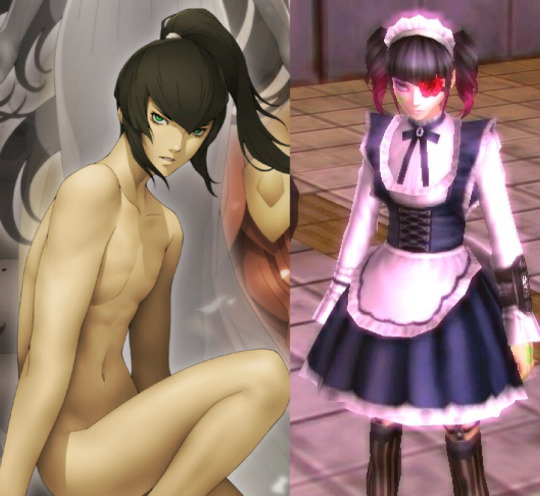
What if I tell you... there's more characterization than it appears to be?
The most consistent trait among Megaten protagonists is certainly their androgyny. Fastidious fans would accept nothing less than the most beautiful eyelashes someone could have the privilege of being born with as it became a long defined characteristic in Kaneko's art.
Considering the franchise debuted with a main character described as a guy that would look good in a skirt, it's no wonder Kaneko (and later, Doi) had to follow the feminine-looking boy legacy:




However, this aspect is not actually that commonly depicted as a self-aware trait in the games. Attractive? Sure. Wooing ladies? Almost always. Specifically having a spotlight on the feminine features, though? Hardly any would be at par with our originator Nakajima.
Which includes Flynn. That being said, even if it's not brought up in the story, Flynn's androgyny is still touched upon not only in his profile notes in the SMTIV Artbook...
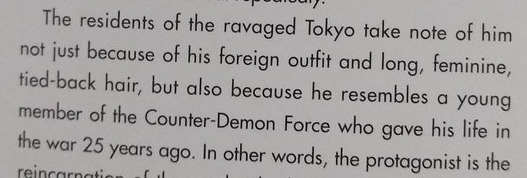
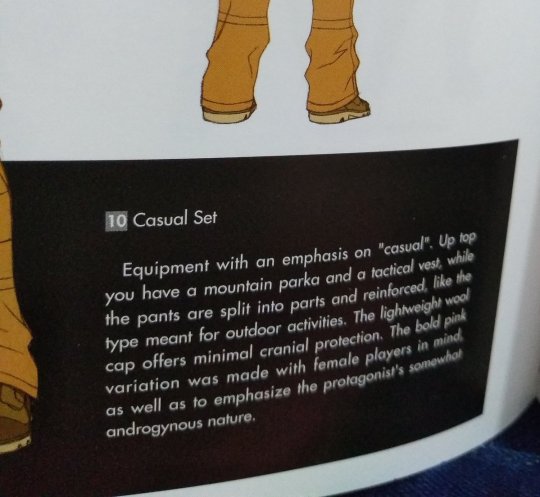
...but also in the way he's perceived in demon negotiations:
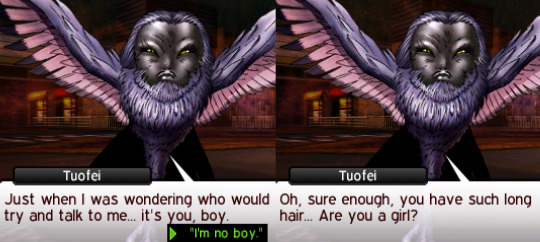
Excuse me!
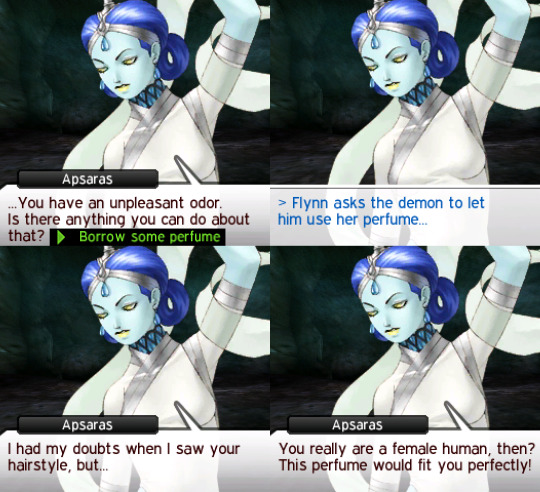
Going from a stinky swordsman to bestie <333 in a flash.

Lham Dearg having this dialogue when the motherfucker shares the same hair lenght as Flynn is some double standards BS.
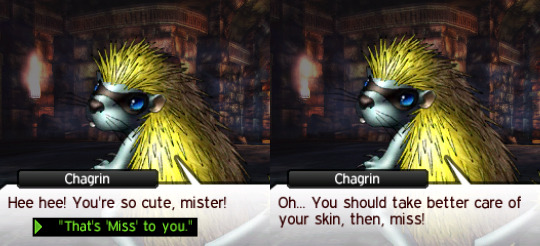
And then Chagrin-chan gives you a Detox solution.
However, you also have a chance of becoming a target of gender rivalry for this same answer:
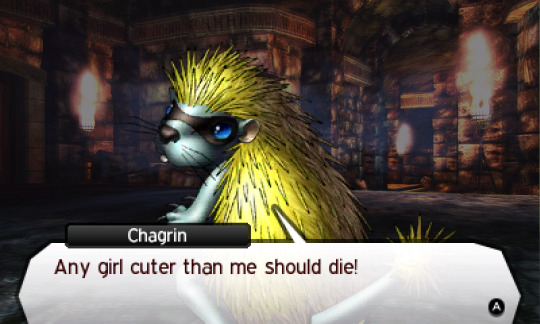
No good, Chagrin-chan.
And then you have the rather unusually neutral way Flynn looks at relics:
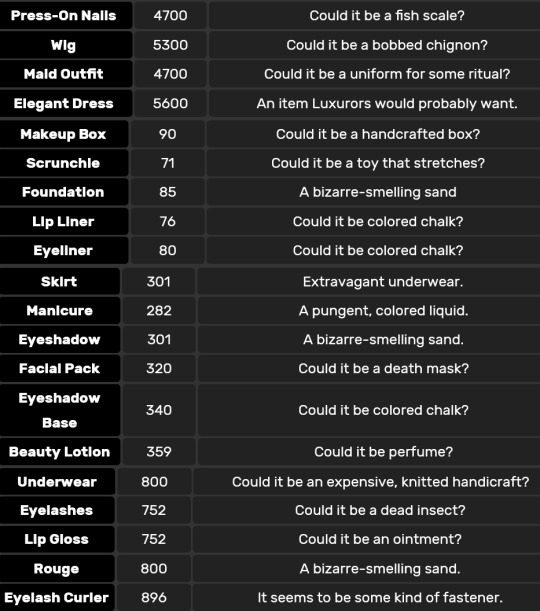
You could argue that it’s due to Flynn being a country bumpkin born in an artificial world currently in its medieval period hence even basic concepts that he would know of would be interpreted differently when seeing their modern versions.
On another note, we also have to recognize that the location with the most conservative worldview is Mikado.
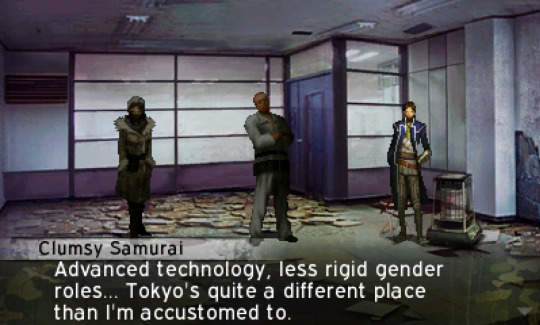
And yet, it's Nanashi the one with very gender-specific commentary:

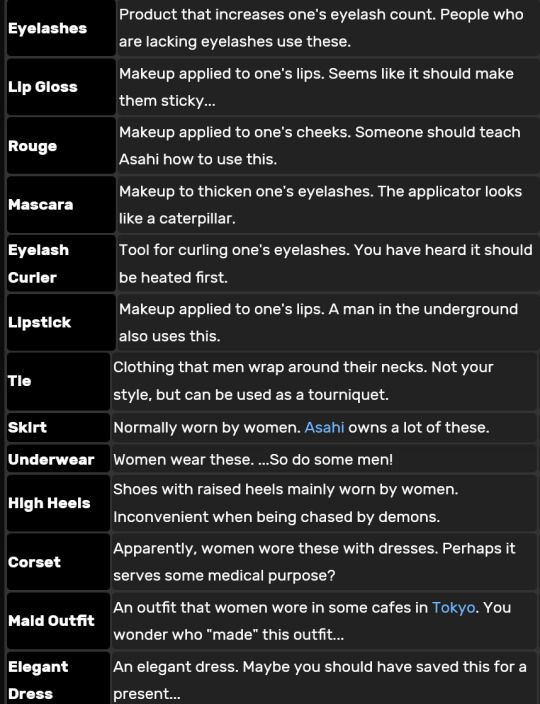
A feasible counterpoint perhaps would lie on the possibility that Flynn didn’t grow with many women around him, specially ones that would invest in their own appearance which would be difficult considering their peasant background.
And an indoctrinated one on top of that.
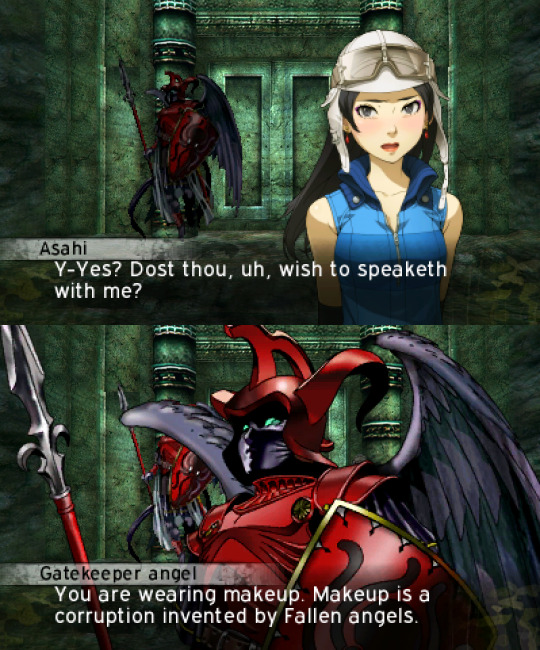
Which isn't to say that there isn't makeup culture in Mikado though, as shown by Isabeau and Gabby.

Regarding Isabeau, I commented before that her choice of fashion seems to be more adapted to her own self-expression rather than a default way of presenting for either Luxurors or Samurai women. At any case, it's still part of a larger issue.
In fact, Luxurors and even monks from the Monastery weren't shown to be as anti-Unclean extremists as the Divine representatives themselves.

In the myth, Gabriel is a messenger who was entrusted to deliver several important messages on God’s behalf. Therefore, as Gabby, Gabriel acts as a mediator and makes God's message understandable to people through adapting her appearance to reach the most hearts as possible.
In other words, we have the picture of peasants being fairly ignorant of new technology (with Flynn among them) and only having the bare essentials while the higher caste thrives over luxuries to the point that becomes normalized what would be considered slightly sinful.
So much that even the angels had to tolerate it to a certain level in order to become close to humans and manipulate them.
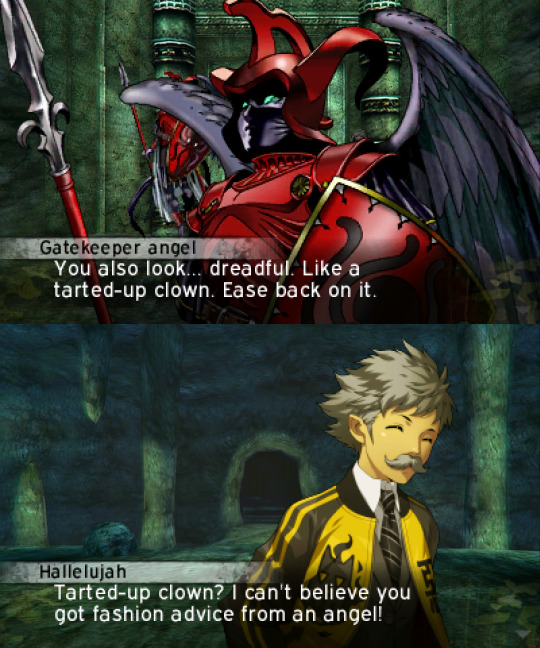
Nanashi, on the other hand, meets so many ladies worried about their appearance all over the underground that he somehow ended up knowing more than Asahi even.
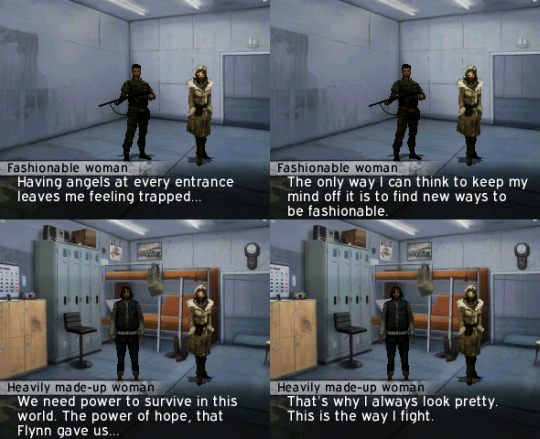
So essentially, Flynn "isn't familiar with female expression" but "effortlessly passes as a woman" regardless of what he's wearing while Nanashi "knows" and "plays around" with it like a costume.
And in both cases, it seemingly comes more "at the player's choice" rather than being done in an unsolicited way.
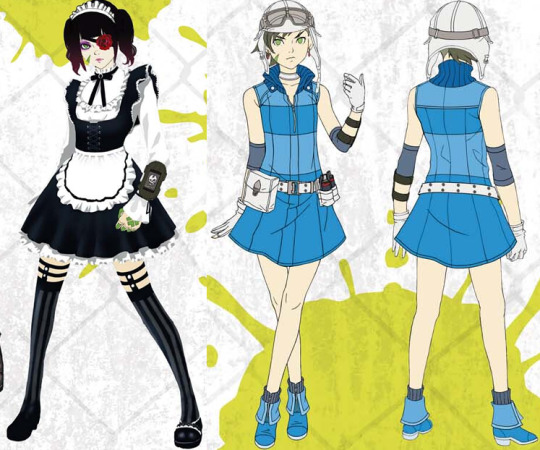


Doi's comments on SMTIVA's wardrobe convey that Nanashi is into wearing flashy clothes. Some fashionable, some dumb, some awfully absurd for anyone to wear in the middle of a war-like environment.
Nanashi basically wants to stand out. He fully knows he looks weird and is having a blast wearing flamboyant shit while fighting demons around Tokyo.

Meanwhile most of Flynn’s wardrobe are basically “gears that Flynn would consider useful for avoiding hazards while being ignorant of what the design means”.
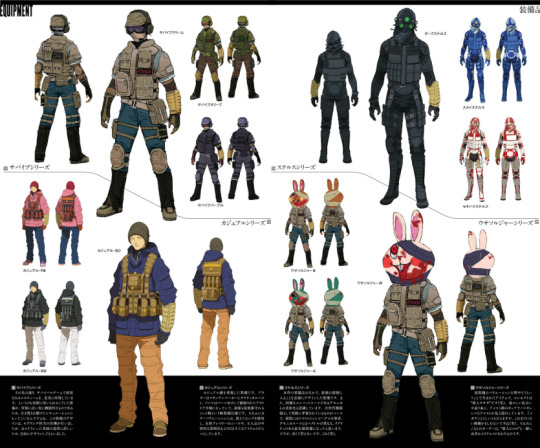
Nanashi does it for fashion while Flynn does it for protection. This is also applied to the situations where the player "can choose" to act feminine: Nanashi crossdresses and wears make up while Flynn lets demons believe he's a woman to get a positive reaction in negotiations.
To summarize, Flynn was intended to be seen as an individual with both male and feminine traits (or the lack of both in some aspects) beyond just the stylistic choice of his androgynous design. While Nanashi is aware of gender roles and his social standing as a guy but also breaks expectations according to his own will.
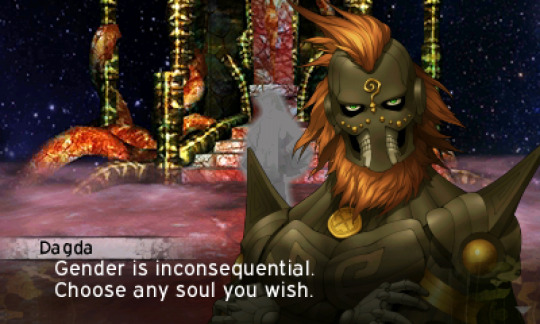
These qualities are coherent to the lore of the story while simultaneously working on a gameplay perspective, as those are ways to bring diverse options for the average player while making female players also feel 'included' even if the protagonist is a boy (as emphasized by Doi himself), which is, to this day, an unbreakable tradition in mainline games:


Somehow, it turns out that Nakajima's legacy comes in handy with a seemingly unisex-presenting main character that is able to fill the gaps of an audience.
On an ending note, while we have yet to see a more complete official breakdown of SMTV's art direction through interviews, one can understandably connect a similar reasoning for the design choices behind Nahobino.

The fanbase of the series combined with Persona has a male-to-female ratio of 40:60, to which confirms the feminine-looking boys indeed reach a bigger female audience than male.
As interesting as it is, one can't help but wonder if we would ever actually reach the other side of the gender spectrum in an actual title. We have horny mods, so there's that at least.
36 notes
·
View notes
Note
What are your thoughts on the magic system, both how JKR has created it in canon and also how you have tried to deepen or change it in Lionheart? In a lot of fanon/other series there’s more clear rules surrounding use of magic and magical strength or talent than it seems like JKR developed in canon.
Current fantasy publishing has trended hard towards hard magic systems, i.e. systems with clear rules, limits, and costs, because those systems make it really easy to establish stakes. Sanderson's books are a great example of hard magic used well, because his books are really interested in how societies built around magic would use them to solve problems.
Soft magic, in contrast, doesn't operate on clear limits. But that doesn't mean it's bad, it's just a different kind of worldbuilding. In his article, Sanderson points out that while hard magic systems thrive on getting the reader invested and scheming with the characters, it de-mystifies the "magic" of it all; it basically becomes technology. Meanwhile, soft magic systems are great at mustering awe and wonder. The risk of a hard magic system is you make your world feel mundane. The risk of a soft magic system is you make your stakes feel irrelevant. Neither of these are necessarily true, they're just risks you need to manage when you're writing. And good authors can manage them. For soft magic writers, you need to be really careful to show that your universe has problems that magic can't solve, even if you don't break down why it can't solve them. Martin and Tolkien are great examples of this. Why can't the eagles fly everyone to Mount Doom? I dunno, but I know they can't! And I trust that a world with his richness and verisimilitude, things happen for reasons, and those reasons, if explained to me, would be satisfying. When Tolkien tells me the eagles aren't a viable solution to the problem of the Ring, I just trust him. Because he's put in the work to make this world believable. Do I need him to invent some fictional rule about eagles being, like, physically unable to cross over that mountain range? What would that accomplish? The thing about magic being soft is you can just accept that sometimes It Doesn't Work, and you're fucked. So there's still a sense of tension and stakes for your characters, because they can't always depend on magic to get the job done. Another way around this problem is just to make the stakes of your series rest on something that magic can't solve, like emotional conflict, or a mystery. This is actually most of the Harry Potter books, in my opinion; they have pretty good stakes that almost always stem from human beings in conflict with each other, which isn't something that you can wave a wand and make go away.
Rowling's magic system is somewhere between hard and soft, whereas you can do X and reliably expect Y magical outcome, but also, it's pretty soft where the limit is. I don't mind this, because I'm pretty willing to handwave glitches in the magic system where it improves the story — so long as it's not a glitch that opens a plot hole, I'm fine not understanding How or Why Exactly a given piece of magic was executed. Dumbledore's escape from the aurors in fifth year, for instance. I don't know how he did that! Doesn't bother me. Because plot-wise, it doesn't make a difference. Because whether or not Dumbledore uses a mechanic I'm familiar with doesn't change the impact of the scene or my understanding of his abilities. The point is that he's super powerful and it would take way more than four aurors to nab him. Cool! Got it. No problem. But if Dumbledore was able to cast a spell that made Umbridge resign? I would be pissed. I don't want magic to fix that problem! I want the characters to develop and emotionally respond to challenges! Don't fuck with my stakes, man!
What also bothers me is when the books introduce technology that does work like straight-up hard magic, i.e., Time Turners. There is no reason a Time Turner should ever fail. It doesn't have a cost; it doesn't have a limit. This is insanely OP, and Rowling has admitted that it kind of fucked her worldbuilding. So I took it out in my fic, because I didn't want to be assed. I've peppered in a few limitations of my own on some things; I've hardcore nerfed Apparation, because I like travel sequences and I think teleportation is boring. The nature of the resurrection magic used by Voldemort seems big enough that there frankly should be a cost, so I'm thinking about that as I'm writing Book 6. Same with the horcruxes. In general, I think the nature of "dark magic" wants more explanation, so I'm trying to get into that more in the future. Plus also Lily's blood protection, and the horcrux/soul-splintering thing, and basically What All Went Down, Magically Speaking, With The Potters—? I'm interested in that. It implies the existence of much older and weirder magical mechanics than we've seen in the rest of the series. How can you do magic unintentionally? Was it unintentional? Much to figure out.
The spell system in general I don't mind, although I think Avada Kedavra is a terrible idea. you have this beautiful unbounded combat system that could be so creative and then you just. gave every wizard a gun. Sad! Also, I really like the idea in the last book of "you have to mean it," with respect to the Unforgivables, which ties in with how the Patronus requires an emotional component; it implies something about intention and willpower that seems like a potentially interesting mechanic.
30 notes
·
View notes
Text
Also, here's what I wrote for the open letter. I don't really know what to say in this preface here without talking about things I already say in the letter itself, but I'll pull what I think is my most poignant topic up, because I think it's the point that people don't understand when they laugh at fans for caring - it's not about the character, it's about the company. It's different in the actual letter (edited to be less mean) but this is the original drag:
The objective of a story is to resonate with its audience emotionally. What we hope you will understand with this collection of letters is that you have a character and story that has already succeeded in this task. It is not protectiveness, or a stubborn unwillingness to adapt to the new; It is that when you as the creators are willing to cast aside this story that so many people have cared about over the years for something so fundamentally different simply for profit, the message we receive is that this emotional resonance is one-sided: that it is set dressing that can and will be turned over for the purpose of attracting more appealing audiences. My question, then, is this: if you as creators do not tell this story with sincerity, if you do not respect the integrity of storytelling as an artform and simply pivot your creative vision as the market demands, then why should we as the audience care about the stories you have to tell? Why should we become invested in any of your characters’ stories if you are simply displaying whatever words on the screen make you the most money — if any one of them could be on the chopping block if the wind blows the right way?
This took a week to get my thoughts together enough to write. Full letter under the cut:
Hi, Riot.
Like many others, I’ve been a Viktor fan for some time now. I dropped in around 2020, and the lore of the game as well as the lorefan community was and continues to be an invaluable lifeline to me. I take pride in participating in community initiatives — I was Viktor’s illustrator in two of the Rift Gala events, and I run an archive for the creative works people have made for him as he exists in League of Legends.
I am rather upset with the recently announced VGU in store for Viktor. I don’t understand the need for Viktor’s new lore to be overwritten so completely with Arcane, which is fundamentally incompatible with the space he occupies in League of Legends — both in terms of his in-game power fantasy as well as his character in the lore.
Overall, this VGU is disjointed and half-baked, especially in comparison with previous, more well-rounded VGU's. Others have put it more eloquently than me, but to highlight a few points, the stagnancy of his kit in 2024 is appalling, and the changes to his cosmetics are evident of a rush-job to meet the Arcane release-date deadline. If the purpose is truly to make Viktor play and feel like the character shown in Arcane, why is his kit full of abilities we never see him use in the show? If you wanted to improve the gameplay for old fans, why is his W maintained without change, not even adding a grounding effect that would help his survivability in the high-mobility champion economy as well as add to the power fantasy thematically (it is a gravity field, after all)? As for his skins, why do Creator and High Noon actively lose detailing? Why was Psyops’ head, which has been complained about since the skin’s release, not altered? Why is the most prominent change simply making his models skinnier?
More broadly, Viktor as he currently exists in League occupies a very specific and very unique niche in the roster of champions. Runeterra as a fantasy realm is interesting for its merging of technology and magic, and Viktor is one such outcome of that — a cyborg engineer whose power comes from his own inventions and conviction. What he is about to become, however, is an apocalypse mage that encroaches on the thematic territory of other characters like Malzahar, Syndra, and Bel’Veth. This is fine within Arcane as a standalone universe, as these characters don’t appear, but in moving this iteration over to League he becomes a redundancy while losing the unique standout points that he brought to the table, which are incredibly important in a game that has almost 170 characters. Why would I be drawn to this apocalypse-bringer when there are others that play better?
I don’t think this rework is a good idea on several fronts, and while I understand a great deal of resources have already been invested in it, I firmly believe that continuing forward on the path it sets re: going on to retcon other Arcane-related champs will only be detrimental to the overall health of the IP. Other champions are in more dire need of an update, and I believe it is unfair that reworks such as the one planned for Shyvana have been pushed back even further to prioritize unneeded retcons that don’t actually address the health of the game. I think cancelling Viktor’s VGU and the rest of the planned Arcane VGU’s to focus on updating historically unhealthy champs is a better use of your resources as game developers and as a company seeking to maintain a satisfied player base.
With respect to the lore of Runeterra, it is not a good idea to attempt to merge Arcane with the existing lore. I understand that Riot is a business, and that the objective of this merger is to capitalize on Arcane audiences, but put plainly: this will not work. It is more work than it is worth on Riot’s behalf to go through with changing the foundational lore of a core region, given that it has been built on top of over the years and will require retcons to many champions in the region past those showcased in Arcane. These retcons are highly likely to cause extensive shifts that are actively detrimental to the themes they present, and will only alienate a loving fanbase that the lore universe is very luck to have. To draw an example: the Marvel Comics Universe and the Marvel Cinematic Universe remain as separate canons — they are too different of interpretations, and it is too difficult to implement. Naming a few champions who would be affected in this way, how does Blitzcrank come into being if not for Viktor? And if Viktor is still its creator, why was this not a key point of his story shown in Arcane? For Camille, how does she exist if Hextech was heavily regulated during the time it was around? How was a Shuriman artificer familiar enough with the science to do her augmentations if it is a new technology?
Lore plotholes aside, I’d like to now talk about Viktor’s characterization.
To start: I think Arcane Viktor is fine in a vacuum. I don’t have anything against him or his story — but I believe that using his success as justification for deleting a well beloved character is unfair. You cannot place Arcane Viktor into the space that League Viktor occupies because they are fundamentally different.
League Viktor as a character is defined by his choice. What he does to himself is calculated and thought out — his augmentations are built through technical ability, his replacement of his limbs a decision made by his commitment to his ideology. His transformation into the Machine Herald is a meticulous process and an informed decision. The conflict between his philosophy and the humanity he can’t entirely let go of makes him compelling, as does the fact that he is the sole person to blame for his own tragedy.
Viktor in Arcane becomes the Herald because he seeks a cure to his terminal illness. What occurs to his body is unintended — when he initially experiments with the Hexcore, he has no idea what is going to happen to him. He could not have predicted what would happen to Sky. There is no meticulous transformation, no true choice in the matter to become what he becomes. He has no true agency — which is an interesting story in its own right, but he is not the Machine Herald.
The objective of a story is to resonate with its audience emotionally. What we hope you will understand with this collection of letters is that you have a character and story that has already succeeded in this task. It is not protectiveness, or a stubborn unwillingness to adapt to the new; It is that when you, the company that owns this character, are willing to cast aside this story that so many people have cared about over the years for something so fundamentally different, the message we receive is that this emotional resonance is one-sided: that it is set dressing that can and will be turned over for the purpose of attracting more appealing audiences.
My question, then, is this: if you as a company do not publish this story with sincerity, if you do not respect the integrity of storytelling as an artform and instead let the market dictate the path of your creative vision, then why should we as the audience care about the stories you have to tell? Why should we become invested in any of your characters’ stories if any one of them could have their core identities fundamentally altered if the wind blows the right way?
I started writing this letter at a gala wrapping up a 4-day national engineering conference that I attended as a delegate of my university. Four years ago, loving this character was the final push for me to choose mechanical engineering as the program I would apply for. I would not be where I am today, nor have the community or close friends I do now without the way this character resonated with me.
The community that this character as he exists in League has fostered is incredibly creative, unique, and passionate. I and many others write this from a place of love for this character and the story you have told with him — which I hope you will understand when you receive these letters.
Thank you for your time.
36 notes
·
View notes
Text
Metal Casting Process At Rudracastings
Rudra castings is a leading manufacturer and supplier of high-quality metal casting products using advanced investment casting techniques.Our metal casting process involves the use of precise molds to create intricate past with excellent dimensional accuracy and superior surface finish.With years of experience in the industry we have honed our investment casting process to deliver exceptional results for our clients.We specialize in producing a wide range of metal casting products,including aerospace,automotive,medical,and defense components.Our investment casting process ensures that we produce parts with consistent quality high strength and excellent durability.At Rudra castings we believe in providing our clients with the best value for their investment.That's why we offer customized metal casting solutions that meet the specific requirements of each project.Contact us today to learn more about our investment casting services and how we can help you achieve your project goals.
http://www.rudracastings.com/
#investment casting manufacturers#investment casting technology#metal casting#investment casting foundry#metal casting near me#stainless steel castings#precision castings#feinguss foundary#lost wax castings#metal casting process#investment casting
0 notes
Text
Calm/Hobby: May 7 & 8 Prompts from @calaisreno
As his Air Baltic flight from Oslo begins its descent into Tallinn, Sherlock stares distractedly out the window at the thinning layer of clouds, and pushes back at the whisper of bleakness that it it is the Estonian coastline coming into view, not the South East shores of England. He girds himself with stoicism as he feels a tendril of melancholy begin to unfurl at the fact that Sherlock Holmes no longer exists, now that Herr Lukas Sigerson has taken his place.
He knows that this new identity will only be the first of many.
Sigerson has brown eyes, and wears dark brown tortoiseshell glasses; his dark hair is beginning to have a salt and pepper cast to it, his lower face is covered by stubble. His loose-limbed gait is relaxed, and there's a remnant of a tendency to stutter when he speaks. Hidden from view are the still-healing cracked ribs on the right side of his torso, the damaged ligaments of his right knee, and the fact that the ossicular chain within his right ear bears traces of having been successfully reconstructed, the surgical repair restoring the hearing he had lost after the trauma to his skull.
When Sherlock had been ready to leave the UK to begin to grapple with Moriarty’s extant remains -- the people and infrastructure and schemes dispersed across the globe -- it had been hard to determine what to do first and where and why. Of the three assassins in London on the day of his fall, the one assigned to Mrs. Hudson – a thuggish fellow more noteworthy for his brawn than any brains – had been rolled up by Mycroft’s people even before Sherlock had been delivered to the morgue. The one assigned to Lestrade had been somewhat harder to ferret out, but as Sherlock began piecing together what details he could collect during his recuperation, he had determined that he was a functionary who had infiltrated the Met – and the resolution of that criminal had also been left to Mycroftian minions.
But John’s sniper was of a different cast altogether, an experienced professional who had made no mistakes and vanished like vapor. Sherlock believed that individual had been more than a freelance hire -– Mrs. Hudson and Lestrade had been brought into the mix of those in danger of losing their lives because every action of Moriarty’s was as theatrical and excessive as it was insane: ransoming John’s life had always been the true motive. John’s sniper would have been especially close to Moriarty, and likely a member of the upper echelon of his criminal syndicate. Sherlock suspected that acquiring the information that would allow him to destroy this person was going to be an exceedingly difficult proposition.
He needed information, and Sherlock had finally decided that the place to begin was with Estonia, the tiny nation that had regained its independence from Soviet occupation in 1991, and that had chosen to bypass the encumbering drag of the impoverished infrastructure bequeathed from the Soviets, by abandoning it. Estonia had instead risked its future by constructing an economy based on the latest digital technologies, leapfrogging more advanced nations as it became a cyber-powered incubator of innovation, and one of the most wired countries in the world. Sherlock had no doubt that Moriarty would have been intent on turning this transformation to his own advantage; he would have found the opportunity irresistible.
Moriarty’s claim to have a code that could take over any computer was false, but even so Sherlock suspected that this fabulation pointed at something all too real: investments by Moriarity in the dark web, and in the recruitment of cadres of hackers to be manipulated into hijacking computer networks. In April and May of 2007, Estonia had been besieged for three weeks by waves of cyberattacks that had crippled its digital public and private sectors, from government entities such as the foreign and defense ministries, to banks, corporate enterprises, and media outlets. Estonia had traced the attacks to actors within Moldova’s breakaway state of Transnistria, a long narrow geographic entity bordering Ukraine that displayed the Soviet Communist hammer-and-sickle on its flag and coat of arms. Sherlock suspected that these cyberterrorist actors were performing roles under Moriarty’s direction, and that he would find information from within Estonia that would point to the far-flung nodes of his enemy’s wretched empire.
With their impending arrival in Tallinn, the melancholy that had emerged begins to become more deeply rooted, and Sherlock’s mind's eye paints pictures of what lies in the deep of the sea passage below, and across the sea miles beyond Britain’s and Europe’s contours – fragments of exploded ordnance littering the ocean floor, where bodies entombed in submarines and battleships are testament to the destructive capabilities of bands of people bent on glory and riches and domination.
His meandering thoughts catch hold of a memory in the viewing room of his mind palace, the one that records the evenings when John had chosen a film to share as they sat propped up together on the sofa in the darkness. It focused on the US Army Air Force unit that flew missions from East Anglia in World War II, and the appointment of a new commanding officer tasked with reversing the underperformance of the bombing teams.
He had been riveted by the harsh speech the uncompromising commander delivers to the group of pilots, who simmer with resentment at his theory that part of their problems lie with their playing it safe. He tells them that while fear is to be expected, the only choice they have is to stop worrying about the fear, and about themselves. He can still feel the chill of premonition when he heard the figure on the screen bite out his message: “We’re in a war – a shooting war. We’ve got to fight. And some of us have got to die." But it was the follow-on command that is engraved in his mind beyond the memory palace, visible in the shadow of all else he is thinking about: "Stop making plans. Forget about going home. Consider yourselves already dead. After that, it won’t be so tough.” And so, too, was his bombing run a flight into the unknown, against unseen enemies, the actions of a self-created ghost who must reckon that he truly inhabits the underworld from this point on.
Sherlock closes his eyes and continues work on the new spaces that he has been constructing in his mind palace, an effort that never fails to bring him calm, even when other emotions are in play. These new rooms are cloisters and refectories based on the architecture of a thirteenth-century monastery, in deference to Tallinn’s remarkable preservation of the medieval city within its precincts, and he has reserved this adjacent building for whatever part Eastern Europe will play in his sojourns. It is complicated artistry, and he is the last one to rise and exit the airplane.
As Herr Sigerson makes his way toward the front of the compact airport, he adjusts the rucksack on his shoulder, and tugs the bottom of his jumper to straighten it. As a standard issue Norwegian, he is, of course, kitted out in knitted wool, although the garment he wears is only a single hue; the vividly colored patterns favored by so many of the inhabitants of his improvised homeland hurt both his eyesight and his sense of fashion. Sherlock smiles at the thought that John would be amused, were he to see his couture, and consider it revenge for Sherlock’s hobby of “inadvertently” wreaking havoc on the least attractive of John’s jumpers.
Sherlock's half-zip pullover is a dark navy blue with a beautiful sheen, and it is not completely devoid of decoration – it is just that the design is woven into the single color, slightly raised, subdued in its visibility. On the back is the Norse symbol of the vegvisir, which was said to allow its possessor to always find the right path, no matter how turbulent the environment might be. Next to the wayfinding icon is a letter from the ancient runic alphabet said to summon good luck. No doubt John would also be amused at the fact that his relentlessly rational friend is carrying these mystical totems on his body. Although, perhaps not, were he to know of the future toward which Sherlock has now committed himself. ........................................................ @calaisreno @totallysilvergirl @friday411 @peanitbear @original-welovethebeekeeper rest of the @s in the tags, which will work for communication purposes, I hope? just say the word if you want to be untagged or tagged xoxoxo
57 notes
·
View notes
Note
hiii chicken. i have an issue i was hoping you can help with, maybe give some ideas. i have a whole list of mental illnesses and a big symptom is struggling with showering everyday plus keeping my house clean. the problem is i feel like i cannot undertake any spiritual task (even a tarot reading) if i haven't fully showered+ cleaned my house. it's a mix of my religious upbringing and feeling like everything is spiritually unclean too if it is physically unclean. i cannot even wave some incense around because it feels useless. i understand the best solution to this is that i actually just keep everything clean but i was hoping to hear something else that might help too. thank you 🫶
Hi, Anon. I imagine that the best solution is probably not just keeping everything clean all the time or else you can't practice your faith.
So I'll speak on the only thing I can, which is magical cleansing theory and technique.
So first! Let's get some definitions going.
Spiritually unclean is a bit of a loaded term, I think, because usually people take "spiritual" to mean "faith; belief; my interaction with what I hold sacred" (&etc), and then spiritually unclean can sound like, "my faith tells me I'm dirty unless I clean all of the time," which I don't think is something I can help with.
Instead, we can perhaps choose more discrete terms to discuss the topic.
One helpful term here may be profane, as in, not sacred; nonreligious. This definition of profane is close to worldly, which is something secular; in contrast to the spiritual.
Completely separate from that is something we might call supernatural energy. For our purposes, supernatural energy can be described as the supernatural body of a wide variety of phenomenon, from emotions, to gods and spirits, to abstractions such as elements and concepts (try channeling the supernatural energy of beauty, or the concept of a cozy mystery novel!).
Given these definitions, we've got a couple of avenues of exploration.
Generally, a lot of witches and practitioners really do enjoy having sacred spaces in their homes. These are usually small spaces, because they tend to be difficult and even tedious to properly maintain.
Few of us have the space to maintain an entire room as a temple in the home; if we're lucky, we get a whole sacred bookshelf. Many practitioners can't, or don't want to, keep sacred spaces in their homes at all.
Wicca and Traditional Witchcraft, and I don't know whom else but I'm sure we're not the literal only two, have dealt with the concept of sacred space by casting a temporary circle, the space within considered to be highly sacred in many ways useful to a witch.
So when you say, "I feel like everything is spiritually unclean," if what you mean is, "I feel like my home is worldly, profane; I want to transform it into a sacred space suitable for practicing my faith," then my reply to you is:
Invest in the witchcraft knowledge and skills which allow you, as the witch, to delineate manageable spiritual spaces within your home and keep them magically safeguarded and separate from everyday living spaces.
Witches can build and safeguard sacred spaces; we have the technology. We can build permanent physical spaces, like altar rooms and shrines, but we can also build temporary spaces, like circles.
After all, if a construction company can block out the profanity of the outside world just by putting cladding on a frame, why can't you separate the sacredness of a small, manageable working space by building magical walls actually intended for that purpose?
Regarding self-cleansing, in your case showering:
If the purpose of your showering is to make you, personally, feel as if you've "crossed the threshold" into a state of sacredness, that's certainly not invalid.
However, it may be worth examining in your practice if A) other things can deliver you into a state of sacredness without triggering unwanted focus on physical cleaning, and B) exactly how sacred you've got to be to perform typical witchcraft practices that you'd like to perform.
In my practice, I wouldn't say I've ever got to get sacred, but I do often have to get into headspace, which may be another function that showering (and cleaning the house itself) is performing for you. If you haven't, practicing shifting your state of consciousness or entering "magical headspace" intentionally and with chosen cues may be very valuable to you.

Now, all of the above completely aside, when you say that you feel your space is spiritually unclean, perhaps what you mean is "my house regularly accumulates supernatural energy, and I feel that it's useless to practice if these other energies are getting in the way."
And that's a whole other can of beans.
The short answer is that this can be dealt with in the same way as sacredness; draw a magical line in the sand, and say "this smaller space is where I'm doing my working, and I'll manage the energy inside of it, but not without."
The long answer is to perhaps begin questioning why your home is so filled with all these stifling supernatural energies, and how you can take proactive steps to limit unwanted types.
People and animals tend to shed energy during the normal course of their lives. Energy does tend to accumulate in unused corners of rooms, even if those corners are regularly tidied and dusted. And all of this is nothing to say of events like parties, arguments, holiday festivities, and spirit or god interactions that can rapidly shift what supernatural energies are cluttering up a place.
In part, this can be dealt with using proactive spellwork. Enchanted objects can be put near doors to comb through incoming energy and help prevent unwanted varieties from coming in. Servitors can be created to munch on certain types of energy and poo out cozy white light. Charms on the top of door jambs work particularly well to manage energy flow through the household.
That incense being waved around can clean out unwanted energy, too - and frankly, if it doesn't, then there is more practice to be had in regards to enchanting substances for the purposes of cleansing.
Normal cleaning can be supercharged with magic to not only ensure unwanted types of energy are removed, but also to have a preventative effect to help stop them from coming back right away.
If there are special factors, like a household member constantly leaking awful vibes onto the rug, magic can also be done to stop their energy from spilling out; or, proactive spellwork can be done to divert or adjust upcoming unwanted events, and so on.
I wouldn't say it's wrong to want a house that specifically has only got your favorite types of energy in it, but the practical does tend to get in the way quite a lot.
Like, I live with other people. Witchcraft isn't mind games or psychology. If you strip the house of energy and refill it with a certain type, other people notice. Pets notice. Spirits especially notice, and Lord knows they're going to have their opinions on it.
If your only method of cleansing your home is entirely cleaning it every single time, there are a lot more helpful and proactive cleansing techniques out there, is what I'm saying.

At the end of the day, I'm real loosey-goosey on belief. Once I believed ritualistic cleansing was the only way, then I believed in the power of regular cleaning, then there was no difference between cleanliness and dirtiness, or sacred and profane; then it all mattered again but it was easy, and coming up here in a minute I suspect it'll all still matter but it'll be hard.
Wanting a sacred space, wanting a clean space, believing in cleanliness and sacredness; these are not the issues.
It sounds like for you, the issue is learning how to manage your needs and separate your sacred/clean working space from your everyday living.
I genuinely think there are a ton of angles to approach your concerns. Why does waving around incense feel useless? Did you not enchant it, and if so, what evidence do you have that your technique works, or does not work? How often have you tried casting spells in your untidy house versus a tidied one, and what are your rates of success for each?
Can you enter magical headspace in an untidy space? Can you do so in public if you have sufficient privacy? Can you do so in someone else's untidy house? How much practice have you put into magical techniques of connection? Have you been relying on cleaning house to shift you into magical headspace?
Anyway. I hope this all helps. Have a great night :)
44 notes
·
View notes
Text

what are we thinking
(explanations / elaborations under the cut)
confidence: ★★★ = most, ☆☆☆ = least
★★☆ mew-chan: there's a popular theory about Gin's apparent significance that suggests any number of things are hidden in mew-chan. i dont feel strongly on one theory or another, but i think it's a solid idea
★★★ Sara does not win (the game): i think it would be poetic if in spite of her win rate / being favoured she refuses to win or otherwise destroys the game
★★★ one bad end: like the mindbreak / Q-taro escapes ending, i think it would be fun if there was a way to fail during the minigame segment
★★☆ Keiji gets decimated: he's overdue and if i don't get to see his mangled corpse i'll be very disappointed. i do not think he is surviving to the main game, and if he does, i think he will be the Sacrifice (there's a convincing argument about how this is the only card he has not had thus far)
★★★ Kai & Joe: this is a loose end i hope is tied up. i'm very invested in Joe's relevance and how suspicious / strange some of his behaviour in chapter 1 is
★☆☆ mishima's head / collar: Midori assumes his collar is how Keiji 'cheated' the russian roulette, so the game clearly hasn't forgotten about it. assuming he is actually dead, i speculate it will be used to cheat / cause issues at some point in 3-2, depending on who actually has it
★★★ Meister doppelgänger: Safalin's clue that floormasters die after meeting their doppelgänger is never used during 3-1's russian roulette. one version of Sara's father and Meister have the same sprites. if Mr. C is not Meister, he is his doppel. if Mr. C is Meister, Dummy!Mr. C is his doppel (see two Mr. Chidouins square)
★☆☆ hospital bed: this is a loose end im looking out for. i've seen some insane cope theories about it & i'm not huge on any in particular, but i would love to see it cleared up
★★★ BANGER music: this should have been the free space but i'm really looking forward to it
★☆☆ we cannot save the Dummies: sorry dummy fans. the game has made a point to make the cast come to terms with the fact that human lives are more important than dummy lives. i think this theme of the value of life will become relevant at least one more time
★★☆ Hades' descendants: Q-taro is an orphan, Reko/Alice & Shin/Kanna are siblings (ie. have one set of parents between them), Gin has a step-father, Sara may or may not be adopted; i think there is some link between the participants' parents and why they were sought out by ASU-NARO
★☆☆ Midori's doll body: it's still out there. where did it go. this is not an insane cope that we see Midori again, i kind of hope we don't, but his fixed dummy body is still in the equation
★★☆ ASU-NARO Gin: ties into the mew-chan theory, elaborates on it. i don't believe he's a liar, but i do think there are a lot of inconsistencies around him. also Miley mother theory is solid and we are definitely not all delusional
★★★ Shin revenge: Shin swears to kill all of us. i specify Keiji because he could realistically be killed (Shin has a soft spot for Gin, and we are the protagonist). i don't really think Shin will anybody, but i think he will be given the opportunity to. (that said if there is an ending where he loses his mind and kills us all i will not complain)
★★★ suicide: whether it's a noble one like Kai's, or a deranged one like Gashu's, i am almost certain there will be a suicide
★★☆ floormaster collars: hey it's the reason i made this bingo at all. i think every single floormaster being trapped by the game (bar Midori, but i'll get to that) is an insane reveal (not just Gashu; if you look at them, all of their necks are hidden from us exactly where a collar would be). i'd love to see a floormaster executed or have their lack of autonomy highlighted in some other way
★★☆ cast revival: i think this would be fucked up, and the technology exists. it also ties into the theme of the value of life, the theme of grief, et cetera
★★★ two Mr. Chidouins: this is my personal tinhat theory that combines the fact that Mr. Chidouin has two distinct sets of sprites, and the fact that the Mr. Chidouin Kai speaks to says he is not Sara's 'real father' (commonly interpreted as adoption, but it's possible this is because this Mr. Chidouin is a dummy). accordingly i think Meister-like Mr. Chidouin (that we see in the winner's room with Sara) is his real/human version
★★☆ memorandum author: i have no strong copes on who (Mr. C / Meister / anyone else), but chances are they will become very relevant as the purpose of the game is finally revealed, and i am assuming we will meet them in person (ie. that they are not long dead)
★★☆ massacre / slaughter ending: either a Sacrifice win or a 'contestant kills everybody in a brutal bloody way' bad end. i will not accept anything ambiguous; i'm looking for an ending where everyone is Dead
☆☆☆ vows & trials: i was going to specifically manifest Gin's first trial being revealed, but i've decided this is my cope square. i want to know about all of them
★★★ Keiji's vow: Mr. Policeman had a kid. "jou" pun. i firmly believe Joe is Mr. Policeman's kid and Keiji's vow was to atone for / get closure for his crime by meeting Mr. Policeman's kid. i hope it recontextualises Joe's initial suspicion of Keiji / attitudes towards police too
★★☆ three new characters: in my mind: Ms. Shortcake (we know of), the dummy version of Mr. Chidouin (previously only seen in Kai's flashback, but likely to become relevant), and a secret third thing. i know this square is a little cheap, but you never know
★★☆ Midori is a huge liar: Midori is at the Least not a traditional floormaster (not a dessert, openly antagonistic & violent towards participants, can remove his collar, was originally supposed to participate), so i speculate that he does not have to follow the floormaster's code, and therefore is able to lie. this boils down to the fact that i simply don't believe that Joe was a handicap, and am suspicious about what is being told to us about AI Sara as well
#kostik speaks#yttd#forgive any nonsense i haven't replayed it in a while + i'm not super familiar with emotions route + i havent played the mini-eps or YTTS#i might replay the game soon but honestly lack of 3-2 has me depressed#but these all pretty much sum up the loose ends i'm keeping an eye on / the theories & observations & recurring themes i think have weight#no meme squares unfortunately as much as i would love to put a square for 'sou gets therapy for his DID'#only in my fanfictions unfortunately...#feel free to talk yttd theories with me btw or argue against / correct anything i've said#im not really a redditor nor a superfan i just really enjoy the game and have a lot of solid thoughts on it#i love to chat. poke me
17 notes
·
View notes
Text
The Amazing Digital Circus severance AU: Meet the outies!
I had more ideas for this and decided that the best way to explore it is with the main cast's other identities!
In the digital adventure work unit, six people work as guides. Each person has their own reason for getting severed.
Agatha (Ragatha) is a mother of five who loves her kids more than anything. She used to be a stay at home mother until an accident put her husband out of work. Now she must provide the money for her family, but how can she balance her work and family life? With severance of course! Now she no longer has to worry about bringing the stress of work back home, giving her all her time to focus on her family. One must wonder where Ragatha's motherly traits come from?
Grace (Gangle) comes from a wealthy family that actually invested in the severance technology for C&A. Grace was force to undergo severance to convince the circus that it was safe. Grace would rather draw pictures and watch anime, but she couldn't say no to her family, so Gangle was born. They say it's fine, but every time she goes to work, she comes out feeling miserable. Could it be a mean co-worker? Regardless, Grace is doomed to be pushed around.
Ray (Kinger) is a kind but odd outcast, who deep down just wants some buddies. Being aware that severance makes you forget your time at work, he nonetheless undergoes it for the potential commodore. And who knows? If he thinks really hard, maybe he will remember something. During the operation, something goes wrong and the chip gets broken. Now Kinger can't remember anything in the digital circus either. Though maybe it's because his memories are mixing...
Jack (Jax) is a complex mix of envy, sadism and hedonist. Jack never cared about having a real job, he just wants to cause problems and have fun doing it. That changes when his sister does something that impresses the whole family. Her making something of herself causes the family to lose faith in Jack. He never had their approval before, but now that they're actively ignoring him, he's a little hurt. After a long time searching, he discovers a job that pays a lot, requires no effort and lets him have fun at other people expense: The digital Circus. Maybe with a steady job, things can go back to the way they were before.
Ash (Zooble) wants to be left alone for the most part. They took the job so that they don't have to remember any people. They wouldn't have even gotten a job if it wasn't so expensive to be alive. Though maybe underneath the cynicism is a person who's unsure about their purpose in life. Maybe they try not to care because caring only hurts you worse in the long run. Though whatever the reason may be, they aren't gonna open up about it anytime soon.
Polly (Pomni) was an accountant caught in a massive layoff at her company. Desperate to find another high paying job, she comes across the Digital Circus thinking that her livelihood was saved. Though the more time she spends working, the more she thinks something is wrong, like her other self doesn't want to be there. She wants to ignore it but she finds herself growing more and more curious. What is the circus like? What is her innie like? She might just have to find that out...
What do y'all think? I certainly had fun writing this! Let me know if y'all want more and I'll come up with something else!
#tadc zooble#tadc pomni#tadc jax#tadc au#tadc#digital circus#tadc ragatha#pomni#severance#tadc kinger#tadc gangle#the amazing digital circus#kinger#the amazing digital circus kinger#gangle#zooble#jax#ragatha#the amazing digital circus ragatha
9 notes
·
View notes